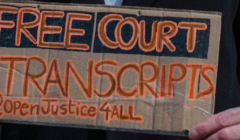
Why Open Justice For All is seeking change for victims
Campaigner Charlotte Schreurs explains why the creative industry is coming together to lobby for change for victims.

All-white 'manels' are often still the norm at industry events. But DICE, launched today, is setting out to change this by introducing a 10-point charter to improve diversity and inclusion across industry conferences and events.

In 2019, the digital marketing event DMEXCO had no fewer than 19 all-male panels. Although the spotlight has been placed on one event, this is a regular occurrence at industry conferences and events. Despite repeatedly being called out by social media users and those across the industry, not much has actually changed with excuses ranging from the ridiculous (‘there are no women’) to the improbable (‘we asked all the women’).
The reality still rings true however; that people should not speak on behalf of a community or experience that isn’t their own. Instead, invite those individuals on stage to represent themselves and to tell their own stories.
This invitation is at the heart of Diversity and Inclusion at Conferences and Events (DICE), a new charter launched by a number of industry figures to improve diversity and inclusion at conferences and events. The coalition of figures stretching across media, innovation and creative has created the 10-point charter for event organisers to follow hoping to ensure the death of the all-white ‘manel’, to avoid tokenism and to be more inclusive across the board.
The charter acts as a series of self-regulatory guidelines, based on the nine protected characteristics outlined in The Equality Act 2010. Event organisers can also submit their agenda for DICE certification.
We believe that representation matters because when you aren’t represented, or heard, the message is you aren’t valued.
Nicola Kemp
The team have launched the charter after speaking extensively to those across the industry and realising that while there has been a lot of talk around the subject of on stage representation, not much was actually being done. Event line-ups are still consistently made up of white, male, middle-class, straight individuals who of course can only really speak from their own experiences.
The stories of those just starting out; stories of what it is to be part of the LGBTQ community in the industry; or working as a BAME creative. These are the stories, alongside many others, that the industry is missing out on as it prioritises the status quo. These are the stories that deserve to be given a platform just as much as those told by the white male CEOs they work alongside.
The DICE charter covers three parts of an event: participation and line-up, content and theme, and marketing. Within these are included race, age, gender, disability, class and neurodiversity as well as the accessibility of the event. It also includes a pledge to ban the platform of hate speech.
The DICE team are steadfast in their goal to achieving no all-male panels by 2021 at any industry event. They have also pledged to review the guidelines every year, based on ongoing conversations and feedback from industry individuals, with a view to refine and update them as needed.
The DICE team is made up of Amy Kean, Head of Strategic Innovation & Creativity at Starcom; Seb Joseph, Brands Editor at Digiday UK; James Whatley, Strategy Partner at Digitas UK; Nicola Kemp, Managing Editor of BITE at Creativebrief; Alex Tait, CEO of Entropy, a commerce and marketing consultancy and Founder of ecommerce-speakers.com and marketing-speakers.com; and Faisal Ahmed, Director of Innovation and Business Transformation at Sudler London.
Kean says that, “By not adequately representing all of society, conferences are sending a message that either they don’t notice inequality, or they don’t mind it.” Kemp adds that representation is key because the choice to exclude certain members of the industry sends a damaging message: “We believe that representation matters because when you aren’t represented, or heard, the message is you aren’t valued.”
Diversity makes companies more successful. This much is evident. It is up to event organisers, alongside guidance from the DICE charter, to champion this on stage, to celebrate the extraordinary creativity and innovation at the heart of our industry, whatever shape or form that might take.
Visit D.I.C.E’s website for more information and to get DICE certified.
Looks like you need to create a Creativebrief account to perform this action.
Create account Sign inLooks like you need to create a Creativebrief account to perform this action.
Create account Sign in